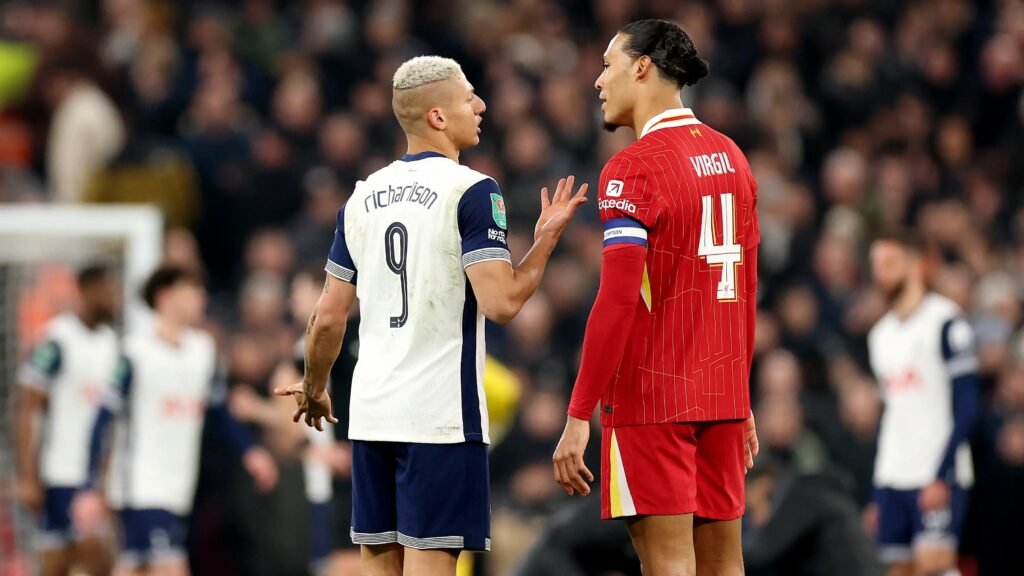In a recent Carabao Cup semi-final first leg between Liverpool and Tottenham Hotspur, a significant controversy emerged involving Liverpool’s captain, Virgil van Dijk, and Tottenham’s forward, Richarlison.

The incident has sparked widespread debate among football analysts, former players and fans alike, raising questions about officiating standards and perceived player privileges.
The Incident Unfolded
During the match, which concluded with a 1-0 victory for Tottenham, van Dijk was involved in a contentious challenge on Richarlison. Observers noted that van Dijk appeared to make contact with Richarlison in a manner that many believed warranted disciplinary action.
However, the referee did not issue a card, nor was the incident reviewed by the Video Assistant Referee (VAR).
Arsenal Legend’s Outcry
The incident drew sharp criticism from former Arsenal legend [Name], who expressed disbelief at the lack of disciplinary action against van Dijk.
He was quoted saying, “How is that not a red? Only Van Dijk would get away with that because he is immune to cards.” This statement underscores a sentiment that certain high-profile players may receive leniency from officials.
Historical Context of Officiating Controversies
This is not the first time van Dijk has been at the center of officiating debates. In a previous encounter against Arsenal, van Dijk was involved in an off-the-ball incident with Kai Havertz.
Despite calls for a red card, the defender faced no retrospective action, leading to discussions about consistency in officiating.
The Role of VAR and Officiating Standards
The introduction of VAR was intended to enhance fairness and accuracy in football officiating. However, incidents like the van Dijk-Richarlison challenge highlight potential inconsistencies in its application.
The lack of a VAR review in this case has led to questions about the criteria used to determine which incidents are examined and the overall effectiveness of the system.
Calls for Accountability and Transparency
In response to the controversy, there have been calls for greater accountability among match officials. Fans and analysts are advocating for clearer communication regarding officiating decisions and the processes behind VAR reviews. The goal is to ensure transparency and maintain the integrity of the sport.
The Appeal Process and Potential Outcomes
Following the match, reports have emerged that an appeal has been filed concerning the officiating decisions. The outcome of this appeal could have significant implications for future matches and the application of VAR.
If the appeal is successful, it may lead to a review of current officiating protocols and potentially stricter enforcement of rules.
The Broader Implications for Football
This incident serves as a microcosm of broader issues within professional football. It highlights the challenges of maintaining consistent officiating standards, the perception of player privileges, and the ongoing debate over the effectiveness of technological interventions like VAR.
Conclusion
The van Dijk-Richarlison incident has ignited a crucial conversation about fairness and accountability in football.
As the appeal process unfolds and the football community continues to debate, it is imperative for governing bodies to address these concerns to uphold the sport’s integrity.
